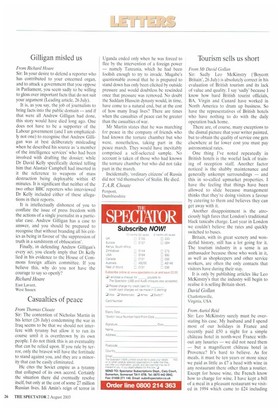Casualties of peace
From Thomas Choate Sir: The contention of Nicholas Martin in his letter (26 July) condemning the war in Iraq seems to be that we should not interfere with tyranny but allow it to run its course until it is overthrown by its own people. I do not think this is an eventuality that can be relied upon. If you rule by terror, only the bravest will have the fortitude to stand against you, and they are a minority that can be easily eliminated.
He cites the Soviet empire as a tyranny that collapsed of its own accord. Certainly the situation there did eventually resolve itself, but only at the cost of some 27 million Russian lives. Idi Amin's reign of terror in Uganda ended only when he was forced to flee by the intervention of a foreign power — namely Tanzania, which he had been foolish enough to try to invade. Mugabe's questionable avowal that he is prepared to stand down has only been elicited by outside pressure and would doubtless be rescinded once that pressure was removed. No doubt the Saddam Hussein dynasty would, in time, have come to a natural end, but at the cost of how many Iraqi lives? There are times when the casualties of peace can be greater than the casualties of war.
Mr Martin states that he was marching for peace in the company of friends who had known the torture chamber but who were, nonetheless, taking part in the peace march. They would have inevitably comprised a self-selected sample. No account is taken of those who had known the torture chamber but who did not take part in the march.
Incidentally, 'ordinary citizens' of Russia did not 'rid themselves' of Stalin. He died.
TA.R. Choate
Penpont, Dumfriesshire


























































 Previous page
Previous page